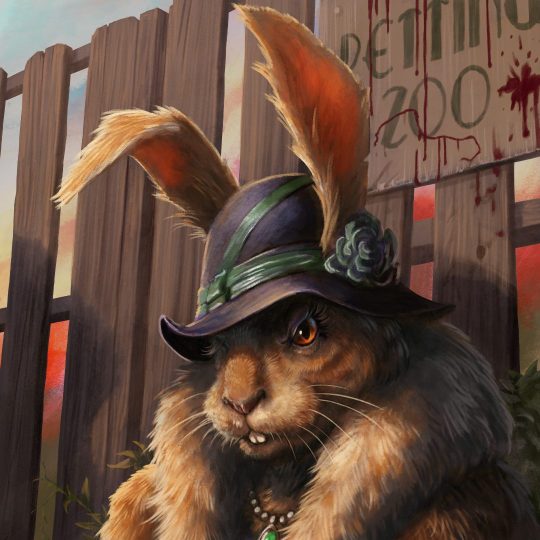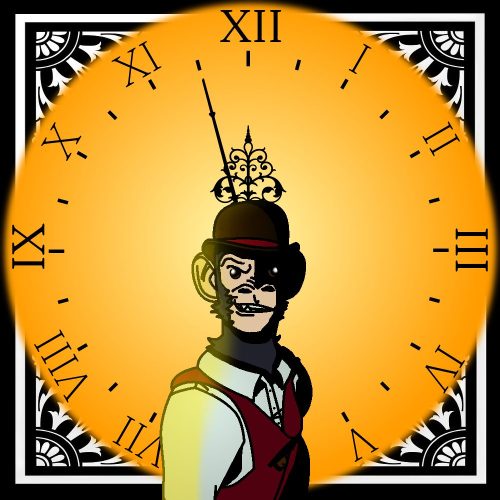
Roleplaying Character Moments Within the Party
 Salutations, nerds, today we’re going to talk about some fluffier stuff but by now I’m sure you know to expect that from me more often than not. I want to get into talking about the roleplaying moments between player characters within the party. RP with the PCs.
Salutations, nerds, today we’re going to talk about some fluffier stuff but by now I’m sure you know to expect that from me more often than not. I want to get into talking about the roleplaying moments between player characters within the party. RP with the PCs.
Dungeons & Dragons is typically a lot of back and forth between the characters and the Dungeon Master. At least 75 percent of the game should be like this, absolutely. It’s what drives the plot forward. We wouldn’t have any action without it. I’ve been thinking a lot, though, about the other 25 percent and what that entails. These are the parts that the players do that, in my opinion, can make or break whether a campaign is memorable.
This is something that has nothing to do with the DM and everything to do with the characters and it’s how you talk to each other during those downtime moments. D&D isn’t just about going on a quest and doing what the DM lays down for you – it’s about making a real connection between characters too.
Creating character moments
I’ll drop an example from Aether Skies because there’s a decent chance you readers have watched them and will already know what I’m talking about, and if not it’s easy enough to go back and see for yourself rather than just having to take my word for it.
 A lot of the moments between characters are implied rather than played out explicitly but enough of it is that I feel like those moments that go unspoken are still pretty clear. Kryzikk and Bunny are a great example of this, to me. They snag little pieces of dialogue here and there, usually while the action is happening rather than in the lulls between, and every time it happens their dynamic shines. Kryzikk pulled Bunny out of a bad situation once upon a time, but they clearly rely on each other and it isn’t at all one sided.
A lot of the moments between characters are implied rather than played out explicitly but enough of it is that I feel like those moments that go unspoken are still pretty clear. Kryzikk and Bunny are a great example of this, to me. They snag little pieces of dialogue here and there, usually while the action is happening rather than in the lulls between, and every time it happens their dynamic shines. Kryzikk pulled Bunny out of a bad situation once upon a time, but they clearly rely on each other and it isn’t at all one sided.
This last session Israel Amadeus shot a casual “good job,” over his shoulder to Kryzikk (who had just pulled off a really spectacular attack and gotten us out of a spot of trouble) and Bunny moved on over to him and asked if Israel was being sarcastic. Kryzikk made a comment back about not having the intelligence to understand the word, and it wasn’t totally clear if he was being sarcastic or not, but the point stuck.
It was a really short exchange, but it spoke volumes of the similar experiences the two characters had been through in the past that none of the rest of the party members really have the base of knowledge to understand. They come from a world that treats them like garbage so it’s natural to assume that even a positive comment has scathing undertones, and it’s easy to imagine not wanting to make a big deal out of that.
The way the characters speak to each other in game gives the implication of the history they have together and sets the tone for what you can imagine they are like when they interact off screen. It’s easy to imagine they don’t just stop existing because their players aren’t speaking out loud and I love that.
Which is all well and good, but how do you bring a breath of life like that to your own gaming table without bogging things way down with awkward moments of small talk?
It’s something I’ve been thinking about a lot this week and I’m going to give breaking it down a try.
Making the most of roleplaying
A lot of what tends to stop people from getting into deep roleplaying at the table is the awkwardness of acting out a part with your friends. We’re tempted to sum things up, to just say “this is what happens and what we’re talking about” instead of actually hashing out the dialogue that comes with it.
That is perfectly valid. Some people aren’t comfortable just going full-on in character and implication is an extremely powerful tool in cases like that. Sometimes less is more, and if you can manage one or two good lines, the things you’re implying and not comfortable giving words to will still come off as serious and it will be a lot easier to imagine for the other people at the table with you.
I would advise starting with the lighter hearted moments if you’re interested in getting more in character at the table. It’s easy to joke, and if your character is joking around when you’re channeling them, it’s less awkward all around as a result. It gets you used to using their voice without all of the melodrama of the really serious moments.
 Going full-on in character can be difficult and awkward at first, but it’s so worth it. Jen from Scarlet Sisterhood is amazing about this. I’ve seen her play out tear-filled conversations as well as just jump straight into incredibly awkward moments with her character without missing a beat and it’s amazing. There’s no skipping the nitty gritty details with her.
Going full-on in character can be difficult and awkward at first, but it’s so worth it. Jen from Scarlet Sisterhood is amazing about this. I’ve seen her play out tear-filled conversations as well as just jump straight into incredibly awkward moments with her character without missing a beat and it’s amazing. There’s no skipping the nitty gritty details with her.
But another thing I’ve noticed about that, is when Jen goes full-on in character, it makes it easier for the rest of us in game to respond in turn. We skim over a lot less when she’s on screen than we do without her because when one of your friends is willing to be a huge dork and isn’t afraid to show their enthusiasm for the character they’re playing, it’s catching.
Go in with no fear. You might be surprised by which of your fellow players are willing to join you once they realize you can get away with it and it’s not so bad. I fully urge people to really get to know the characters alongside them, and it’s way easier if they’re talking about something and not making small talk.
Ask them about their hopes and dreams. Ask them about the worst thing that’s ever happened to them. If you’re comfortable enough with your friends and know they know it isn’t personal, don’t be afraid to start a fight with another PC at the table because conflict is the life blood of the RP and seeing a character when they’re rubbed the wrong way at one of their friends can be an amazing experience. At the very least it won’t be boring.
 Starting conversations when it’s time to take watch is a great time to have conversations like that. Swinging back to Aether Skies for a second, my character, Dr. Lucy, had a really good one with Israel not long ago in which she asked him to take her down if her magic pushed her under and she wasn’t able to get back on her own. We had the time we needed to hash that dialogue out. There was another instance in which Roz Rakheta approached Lucy in her room and in rare form asked her about some of the make up she used and kind of a scuzzy lady or not they bonded over that and it really showed another dimension to Roz other than the tough-as-nails dwarf she shows everyone on the outside.
Starting conversations when it’s time to take watch is a great time to have conversations like that. Swinging back to Aether Skies for a second, my character, Dr. Lucy, had a really good one with Israel not long ago in which she asked him to take her down if her magic pushed her under and she wasn’t able to get back on her own. We had the time we needed to hash that dialogue out. There was another instance in which Roz Rakheta approached Lucy in her room and in rare form asked her about some of the make up she used and kind of a scuzzy lady or not they bonded over that and it really showed another dimension to Roz other than the tough-as-nails dwarf she shows everyone on the outside.
Don’t be afraid to ask for time to roleplaying something if you have a conversation you want your PC to have with someone else’s. You would be surprised how patient your friends will be particularly if it makes them realize it’s okay for them to do the same thing sometimes.
And if that isn’t your group’s cup of tea (totally possible) you can absolutely make use of those moments during the action. If someone is fumbling picking a lock, take a moment to tease them about it and see what they say. Yell something encouraging across the battlefield during a fight. Ask the other character how they’re holding up while you’re bandaging their wounds and see what it leads to.
Most importantly, do it at the pace that’s comfortable for you. For some people, that’s going to be not at all and that’s okay. But if it’s something you’re interested in doing, give it a shot. The worst thing that can happen is it doesn’t work out and you’re back to where you were.
Whatever it is, though, that your character’s relationship is to their fellow party members, it’s worth giving exploring it a chance. Are they rivals? Brothers in arms? Best friends? Siblings? One bad incident away from being each other’s worst nightmare? Maybe even on the cusp of being more than friends? For those already doing this, I hope you’re having an amazing time. For those who are interested and haven’t started yet. Well. You’ll never know unless you try it out, will you?
[amazon_link asins=’0226249441,1533443475,0786966114′ template=’ProductCarousel’ store=’nerdarchy-20′ marketplace=’US’ link_id=’ba19a34c-80a9-11e7-a7e4-91126ede4170′]










Jen "Pixelscapes" Gagne
August 15, 2017 at 1:52 pmI definitely need to put “willing to be a huge dork” in the “Other Skills” section of my professional resume. It is highly accurate! Great article, Megan.
Eric W.
February 9, 2018 at 4:06 amI might note that using a different voice and or change in body language will make it more clear for other players when you’re speaking in character. (I’m not prone to using my hands while talking, so when I raise my arms above my shoulders, raise my voice a couple of octaves, or slap a silly grin on my face, others at the table realize I’ve begun speaking as my character.) It also makes for good practice for if/when you decide to dabble at DMing and want the NPCs to stand out.